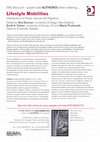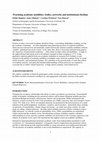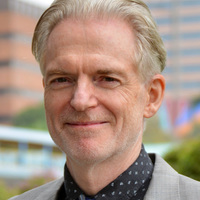Lifestyle mobilities by Tara Duncan
Lifestyle mobilities: Intersections of travel, leisure and migration - Chapter 1, Dec 2013

""""Being mobile in today's world is influenced by many aspects including transnational ties, inc... more """"Being mobile in today's world is influenced by many aspects including transnational ties, increased ease of access to transport, growing accessibility to technology, knowledge and information and changing socio-cultural outlooks and values. These factors can all engender a (re)formation of our everyday life and moving - as and for lifestyle - has, in many ways, become both easier and much more complex.
This book highlights the crossroads between concepts of lifestyle and the growing body of work on 'mobilities'. The study of lifestyle offers a lens through which to study the kinds of moorings, dwellings, repetitions and routines around which mobilities become socially, culturally and politically meaningful. Bringing together scholars from geography, sociology, tourism, history and beyond, the authors illustrate the breadth and richness of mobilities research through the concept of lifestyle.
Organised into four sections, the book begins by dealing with aspects of bodily performance through lifestyle mobility. Section two then looks at how we can use mobile methods within social research, whilst section three explores issues surrounding ideas of mobility, immobility and belonging. Finally, section four draws together a number of chapters that focus on the complexities of identity within mobility.
Often drawing on ethnographic research, contributors all share one common feature: they are at the forefront of research into lifestyle mobilities.""""
Mobilities, 2015
"""This article examines how the mobilities paradigm intersects with physically moving as an on-g... more """This article examines how the mobilities paradigm intersects with physically moving as an on-going lifestyle choice. We conceptualise a lens of ‘lifestyle mobilities’ that challenges discrete notions of, and allows for a wider grasp of the increasing fluidity between travel, leisure and migration. We demonstrate how contemporary lifestyle-led mobility patterns contribute to and illustrate a breakdown in conventional binary divides between work and leisure, and a destabilisation of concepts of ‘home’ and ‘away’. We unpack issues of identity construction, belonging and place attachment associated with sustained corporeal mobility, and conclude by suggesting avenues for the further study of lifestyle mobilities.
Keywords: lifestyle, corporeal, mobility, identity, belonging
"""
Papers by Tara Duncan

Tourism Geographies, Dec 4, 2017
ABSTRACT How career paths are interpreted and conceptualised by hospitality workers and industry ... more ABSTRACT How career paths are interpreted and conceptualised by hospitality workers and industry representatives remains underexplored in current literature. In this paper, we highlight and discuss sector-specific and contextual factors that influence the possibility of establishing a career within the Swedish hospitality sector. The paper uses interviews with hotel managers, who describe and discuss motivations and choices made throughout their own careers and interviews with young (former) seasonal hospitality workers who describe and reflect on their future plans and work-life experience. Additional data are derived through observations at national seminars and meetings for representatives from the Swedish tourism and hospitality industry, where issues of competence and careers were discussed. The findings indicate that the shaping of career paths within the hospitality sector is influenced by two normative and discursively produced ‘truths’ about career paths in the hospitality sector: the importance of internal knowledge transfer and the importance of high mobility. These narratives impose expectations on individuals to be mobile, to change jobs frequently and to work their way from the bottom-up within the industry, and are based on a presumption of a diversified and dense local hospitality labour market. However, since the conditions are different due to contextual, geographical features of labour market size and structure, attractiveness of places, etc., these expectations are difficult to fulfil in places other than in larger urban areas. These normative assumptions of what a successful hospitality career is also have consequences for the development of the hospitality sector as external influences of competence from other sectors and higher education are not seen as valuable, which makes the sector self-contained and not open to external, potentially innovative knowledge.
The Future of Food Tourism
Journal of China Tourism Research
This study explores the precariousness experienced and perceived by Chinese working holiday maker... more This study explores the precariousness experienced and perceived by Chinese working holiday makers in New Zealand, and thereby challenges the more commonly and broadly disseminated positive narrati...

CAUTHE 2020: 20: 20 Vision: New Perspectives on the Diversity of Hospitality, Tourism and Events, 2020
This paper provides a conceptual framework representing the major determinants of the impact of e... more This paper provides a conceptual framework representing the major determinants of the impact of electronic word of mouth (eWOM) on consumer behaviour in tourism and hospitality. Constructed based on a systematic review of online consumer behaviour within and beyond the field of eTourism, the conceptual framework proposed in this paper classifies the most important determinants of the impact of eWOM on consumer behaviour in four categories of source-related, consumer-related, product-related and message-related determinants. Synthesising the body of literature on the determinants of the impact of eWOM on consumer behaviour provides eTourism academia with a summarised, comprehensive and systematic understanding of the well-established determinants of eWOM adoption and directs researchers in this field towards bridging the gap in our current understanding of eTourism consumer behaviour, by focusing on the less-studied aspects of this phenomenon.

Handbook of e-Tourism, 2020
The field of eTourism research encompasses a plethora of research on users’ adoption and acceptan... more The field of eTourism research encompasses a plethora of research on users’ adoption and acceptance of technologies. As a multidimensional phenomenon, an in-depth understanding of eTourism technology acceptance requires crossing the boundaries of tourism and hospitality, Information and Communication Technologies and marketing. Taking such a multidisciplinary approach enables researchers to integrate knowledge from the broader disciplines of psychology, sociology and economics to construct a deep understanding of users’ behaviour. However, while there have been some recent advances in broadening the horizons of research in this field, the majority of eTourism technology acceptance research relies on a few classical technology acceptance and consumer behaviour theories. This chapter presents a summarised overview of the most important determinants of technology acceptance behaviour and critically reviews most influential theoretical models that have been used as the foundation of the majority of existing research in this field. Subsequently, some major areas of theoretical and empirical gaps in our understanding of eTourism technology acceptance will be discussed to provide researchers with a pathway towards further expanding the boundaries of research in this field. This chapter assists emerging researchers in this field to gain an overall understanding of the progress of research so far. It also directs emerging researchers towards developing alternative research agendas to diversify the theoretical foundations of eTourism technology acceptance research and expand the boundaries of knowledge in this field beyond the status quo.
ABSTRACT: Defining and measuring organizational culture (OC) is of paramount importance to organi... more ABSTRACT: Defining and measuring organizational culture (OC) is of paramount importance to organizations because a strong culture could potentially increase service quality and yield sustainable competitive advantages. However, such process could be challenging to managers because the scope of OC has been defined differently across disciplines and industries, which has led to the development of various scales for measuring OC. In addition, previously developed OC scales may also not be fully applicable in the hospitality and tourism context. Therefore, by highlighting the key factors affecting the business environment and the unique characteristics of hospitality industry, this paper aims to align the scope of OC closely with the industry and to put forth the need for a new OC scale that accurately responds to the context of the hospitality industry.
Encyclopedia of Tourism, 2016
The sacred and the profane Mircea Éliade's 1959 treatise on the nature of religion, The Sacred an... more The sacred and the profane Mircea Éliade's 1959 treatise on the nature of religion, The Sacred and the Profane, deals with
Annals of Leisure Research, 2020

Tourism Review, 2020
Purpose Despite its volume, the academic research on the impact of electronic word of mouth (eWOM... more Purpose Despite its volume, the academic research on the impact of electronic word of mouth (eWOM) on tourism and hospitality consumer behaviour is fragmented and largely limited to investigating a small scope of its impact. The purpose of this paper is to bridge this gap by synthesising the existing literature, providing a conceptual framework for the various dimensions of this impact. Design/methodology/approach This paper is based on the meta-synthesis and a critical conceptual analysis of relevant academic literature identified using a keyword search of papers via the Web of Science and Scopus databases, followed by a snowballing process comprising tracking the citations to the resources referred to in the identified papers. Findings This conceptual analysis illustrates how the full spectrum of the impact of eWOM on tourist behaviour spans well beyond the limited scope traditionally focussed on by tourism and hospitality researchers. This scope, encompassing multiple cognitive, ...
Journal of China Tourism Research, 2019
This study aims to explore the personal changes of Chinese youth from their working holiday exper... more This study aims to explore the personal changes of Chinese youth from their working holiday experiences in New Zealand. By drawing on semi-structured interviews, this study recruited thirty-four Chinese working holiday makers (WHMs) in New Zealand. A modified thematic analysis was adopted to analyze the interview transcriptions. Five themes have been developed, including independence, bravery, tolerance, marriage attitudes, and friends making. The findings of this study demonstrate the complexities and multi-dimensions of Chinese WHMs' personal changes during their working holiday experiences and contribute to the literature by delving into the relationship between these personal changes and the social-cultural context in which they are from. The findings also offer insightful suggestions for future studies.

Journal of China Tourism Research, 2019
The working holiday scheme of New Zealand provides young Chinese with a unique opportunity to hav... more The working holiday scheme of New Zealand provides young Chinese with a unique opportunity to have a prolonged work or study and travel experience in New Zealand. Until September 2015, New Zealand was the only working holiday destination for young Chinese and more recently only New Zealand and Australia offer this scheme to young Chinese. With the increasing interest in long-term backpacking, Chinese youth have chosen working holidays as their way to experience the world. The question is thus raised as to why it is that Chinese youth chose working holidays among different options and moreover, what affects their decision to embark on working holidays. This study explores and presents a thematic analysis of thirty-four woking holiday makers (WHMs) from Mainland China. Three organizing themes, namely escapism, cost efficiency and timing, are identified and discussed through consideration of cultural and social influences. The findings of this study facilitate the understanding of this growing cohort of Chinese WHMs. With the possibility of more countries initiating similar schemes for young Chinese, implications and future research directions are also discussed.

Tourism Geographies, 2017
ABSTRACT How career paths are interpreted and conceptualised by hospitality workers and industry ... more ABSTRACT How career paths are interpreted and conceptualised by hospitality workers and industry representatives remains underexplored in current literature. In this paper, we highlight and discuss sector-specific and contextual factors that influence the possibility of establishing a career within the Swedish hospitality sector. The paper uses interviews with hotel managers, who describe and discuss motivations and choices made throughout their own careers and interviews with young (former) seasonal hospitality workers who describe and reflect on their future plans and work-life experience. Additional data are derived through observations at national seminars and meetings for representatives from the Swedish tourism and hospitality industry, where issues of competence and careers were discussed. The findings indicate that the shaping of career paths within the hospitality sector is influenced by two normative and discursively produced ‘truths’ about career paths in the hospitality sector: the importance of internal knowledge transfer and the importance of high mobility. These narratives impose expectations on individuals to be mobile, to change jobs frequently and to work their way from the bottom-up within the industry, and are based on a presumption of a diversified and dense local hospitality labour market. However, since the conditions are different due to contextual, geographical features of labour market size and structure, attractiveness of places, etc., these expectations are difficult to fulfil in places other than in larger urban areas. These normative assumptions of what a successful hospitality career is also have consequences for the development of the hospitality sector as external influences of competence from other sectors and higher education are not seen as valuable, which makes the sector self-contained and not open to external, potentially innovative knowledge.

Journal of Hospitality and Tourism Technology, 2019
Purpose The purpose of this study is to evaluate eTourism technology acceptance literature to ill... more Purpose The purpose of this study is to evaluate eTourism technology acceptance literature to illustrate current gaps in the field and suggest two alternative perspectives that could be adopted. Design/methodology/approach A review of academic literature in the field of eTourism technology acceptance was undertaken combining a systematic keyword-based search and snowballing techniques leading to the identification of relevant academic journal articles published since the year 2000. Findings While the field of eTourism technology acceptance research has grown substantially over the past few decades, this study highlights that the majority of this research seems to have been conducted within a narrow theoretical scope. The study suggests that this has led to contemporary theoretical and philosophical advancements in understanding the psychological, sociological and neuroscientific aspects of consumer behaviour not yet being mirrored in the eTourism technology acceptance research. Rese...

The Geographical Journal, 2019
Notions of what a successful academic should be doing – researching, publishing, teaching, servin... more Notions of what a successful academic should be doing – researching, publishing, teaching, serving the academic community – are often dependent upon particular practices of corporeal mobilities. These practices discursively and materially connect historically situated academic mobilities with the “modern,” globalised university system. At the same time, there is increasing attention being paid to the “hypocrisy of hypermobile academics” – often reliant on high‐carbon aeromobilities – in light of the unprecedented and urgent need to decarbonise transport to limit warming to 1.5°C. Using qualitative material gathered from one academic institution in Aotearoa New Zealand, we pay attention to the politics of academic mobilities at multiple scales, from the academic body, to social/family networks, and institutional rhythms. We contribute to the growing body of work that reflects on academic practice, and argue that detailed understandings of these processes are required to overcome the ...











Uploads
Lifestyle mobilities by Tara Duncan
This book highlights the crossroads between concepts of lifestyle and the growing body of work on 'mobilities'. The study of lifestyle offers a lens through which to study the kinds of moorings, dwellings, repetitions and routines around which mobilities become socially, culturally and politically meaningful. Bringing together scholars from geography, sociology, tourism, history and beyond, the authors illustrate the breadth and richness of mobilities research through the concept of lifestyle.
Organised into four sections, the book begins by dealing with aspects of bodily performance through lifestyle mobility. Section two then looks at how we can use mobile methods within social research, whilst section three explores issues surrounding ideas of mobility, immobility and belonging. Finally, section four draws together a number of chapters that focus on the complexities of identity within mobility.
Often drawing on ethnographic research, contributors all share one common feature: they are at the forefront of research into lifestyle mobilities.""""
Keywords: lifestyle, corporeal, mobility, identity, belonging
"""
Papers by Tara Duncan
This book highlights the crossroads between concepts of lifestyle and the growing body of work on 'mobilities'. The study of lifestyle offers a lens through which to study the kinds of moorings, dwellings, repetitions and routines around which mobilities become socially, culturally and politically meaningful. Bringing together scholars from geography, sociology, tourism, history and beyond, the authors illustrate the breadth and richness of mobilities research through the concept of lifestyle.
Organised into four sections, the book begins by dealing with aspects of bodily performance through lifestyle mobility. Section two then looks at how we can use mobile methods within social research, whilst section three explores issues surrounding ideas of mobility, immobility and belonging. Finally, section four draws together a number of chapters that focus on the complexities of identity within mobility.
Often drawing on ethnographic research, contributors all share one common feature: they are at the forefront of research into lifestyle mobilities.""""
Keywords: lifestyle, corporeal, mobility, identity, belonging
"""